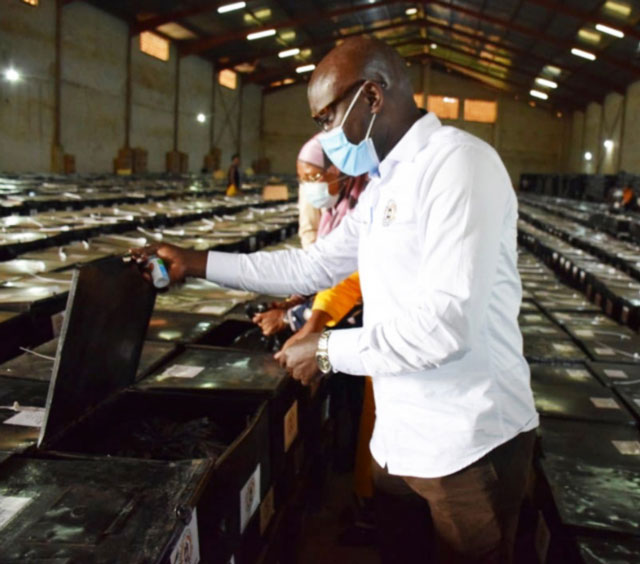
distribution . COURTESY PHOTO
Processions and public/mass rallies were banned but candidates were allowed to organize/hold campaign meetings, in a regulated manner, preferably outdoors, with limited attendance of a maximum of 200 people to enable the observance of the 2-metre social distancing rule for the persons attending the meeting.
Candidates and their agents were also advised to use non-contact means of communication to interact with the electorate. These included fliers, leaflets, brochures, posters, billboards and banners; radio and television programmes and talk shows; short messaging services (SMS), voice messaging, and digital media platforms and websites.
Candidates were also allowed to use the community-based Public Address Systems between 7am-9am and 4pm-6pm, as per the campaign programmes harmonized with the respective Electoral District Returning Officers.
But Opposition parties said the EC proposals were “unrealistic and could not work in Uganda.” In any case, they added, Byabakama never consulted them.
Joseph Kabuleta, one of the 10 candidates facing off with Museveni added that the EC is just “covering up” for President Museveni. “COVID-19 has been a perfect excuse for many things and it is going to be an excuse for so many others. This is just a cover-up and they are milking the COVID-19 crisis.”
“No Ugandan should be fooled into believing that Museveni is doing this for the safety of Ugandans,” Kyagulanyi said, “There was no coronavirus when our consultations were blocked. There was no coronavirus when Museveni personally ordered the blocking of our music shows.”
The Forum for Democratic Change (FDC), Uganda’s biggest opposition political party also rejected the EC’s digital campaign proposal saying the EC’s proposal is “intended to ban freedom of assembly.”
“The only election provided for in the Constitution is one in which citizens actively participate. COVID-19 or no COVID-19, the standards remain the same,” he said, “For an election to be an election under the Constitution, it must be free and fair in which citizens actively participate.”
“These elections are not elections of the Electoral Commission or candidates only; they are Uganda’s elections. At every turn, Justice Simon Byabakama has handled elections as a private matter,” said Ibrahim Ssemujju Nganda, FDC’s spokesperson.
With the electoral preparations happening in an environment of restrictions, political analysts feared for the worst. And the worst happened.
When the campaigns kicked off on Nov. 09, Uganda’s security forces engaged in violent battles with opposition candidates and supporters. Although blocking opposition candidates and their activities has been standard fare in all previous elections, Byabakama appears to have handed the security agencies perfect cover this time; they say they are enforcing COVID-19 guidelines and standard operating procedures. But President Museveni’s events, even when they are attended by big crowds, are never disrupted.
On Nov. 18 and 19, the nation and the world were shocked when, following the arrest of the Forum for Democratic Change’s Patrick Oboi Amuriat, and the National Unity Platform’s Kyagulanyi Robert Ssentamu, security personnel killed dozens of protesters in Kampala, Mukono, Masaka, Jinja, Iganga, Bugiri, Busia and Mbale and other smaller towns.
At this point, there were calls for the political campaigns to be called for. Political observers said Byabakama had abdicated his constitutional role of supervising the election and instead the security forces had taken over. A case in point was when Byabakama only issued statement days after the bloodletting events of Nov.18 calling on the security forces to stop harassing opposition presidential candidates.
But Kaheru told The Independent that a neutral voice expected from the EC on areas of discontent among stakeholders has not been loud enough and sometimes not heard at all. These and others continue to fuel disgruntlement and suspicion.
Perry Aritua, the executive director of Women’s Democracy Uganda,a Kampala-based civil society organisation told The Independent on Jan.07 the letter Byabakama wrote to the Inspector General of Police following Kyagulanyi’s complaint of harassment from Police was shocking considering that Byabakama is a judge who trades in the realm of evidence.
“He did not attach any evidence showing the districts where Kyagulanyi had been harassed and that is why the IGP simply wrote back asking for evidence of the harassment,” she said.
Aritua told The Independent that Byabakama’s Electoral Commission has had very limited engagement with stakeholders in this election.
“That is why he has appeared like he is firefighting each time he issues directives,” she says. Aritua says this has been the case from the time Byabakama issued a revised roadmap for the 2021 election.
“The ability to communicate and dialogue with stakeholders is a keystone to an election period as you must be seen to transparent,” she says.
Kaheru notes that Byabakama has not been alive to the fact that today’s electorate is more enlightened about their rights and with the digital information era with us, the demand for real time information sharing and engagement form such a critical part of the electoral process.
Interestingly, with just days to the polls, Byabakama and the opposition candidates appear not to be on the same page and have continued issuing contradicting information to the 18 million voters.
Amidst all this, Kiggundu told reporters he gave Byabakama and his EC team one little bit of advice during the handover in November 2016. “I told the team that if you make the (electoral) laws your bedmate, your job is half done.” Byabakama needs to remember that but will he?
READ OTHER STORIES HERE
 The Independent Uganda: You get the Truth we Pay the Price
The Independent Uganda: You get the Truth we Pay the Price



